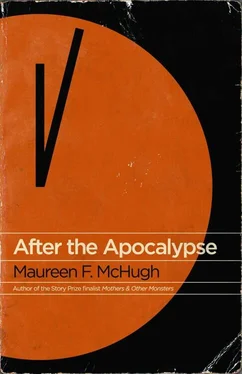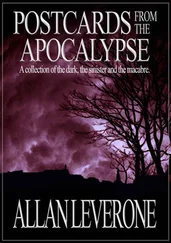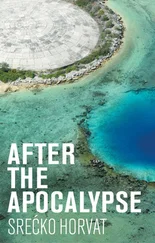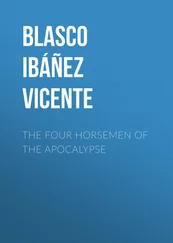So banal. So strange and yet so banal. I try to imagine him giving the doll to a woman, telling her that it was the image of his dead child. How did that work?
Orders for dildos begin to trickle in. I get a couple of doll orders and make a payment on the credit line and put away some toward real-estate taxes. I may not have to live in my car.
One evening, I am working in the garden when Abby and Hudson start barking at the back gate.
I get off my knees, aching, but lurch into the house and into the bedroom where I grab the 9 mm out of the bedside table. It isn’t loaded, which now seems stupid. I try to think if I should stop and load it. My hands are shaking. It is undoubtedly just someone looking for a meal and a place to recharge. I decide I can’t trust myself to load, and besides, the dogs are out there. I go to the back door, gun held stiffly at my side, pointed to the ground.
There are, in fact, two of them, alike as brothers, Indian looking with a fringe of black hair cut in a straight line above their eyebrows.
“Lady,” one says, “we can work for food?” First one, then the other sees the gun at my side, and their faces go empty.
The dogs cavort.
“I will give you something to eat, and then you go,” I say.
“We go,” the one who spoke says.
“Someone robbed me,” I say.
“We no rob you,” he says. His eyes are on the gun. His companion takes a step back, glancing at the gate and then at me as if to gauge if I will shoot him if he bolts.
“I know,” I say. “But someone came here, I gave him food, and he robbed me. You tell people not to come here, okay?”
“Okay,” he says. “We go.”
“Tell people not to come here,” I say. I would give them something to eat, something to take with them. I hate this. They are two young men in a foreign country, hungry, looking for work. I could easily be sleeping in my car. I could be homeless. I could be wishing for someone to be nice to me.
But I am not. I’m just afraid.
“Hudson! Abby!” I yell, harsh, and the two men flinch. “Get in the house.”
The dogs slink in behind me, not sure what they’ve done wrong.
“If you want some food, I will give you something,” I say. “Tell people not to come here.”
I don’t think they understand me. Instead they back slowly away a handful of steps and then turn and walk quickly out the gate, closing it behind them.
I sit down where I am standing, knees shaking.
The moon is up in the blue early evening sky. Over my fence I can see scrub and desert, a fierce land where mountains breach like the petrified spines of apocalyptic animals. The kind of landscape that seems right for crazed gangs of mutants charging around in cobbled-together vehicles. Tribal remnants of America, their faces painted, their hair braided, wearing jewelry made from shiny CDs and cigarette lighters scrounged from the ruins of civilization. The desert is Byronic in its extremes.
I don’t see the two men. There’s no one out there in furs, their faces painted blue, driving a dune buggy built out of motorcycle parts and hung with the skulls of their enemies. There’s just a couple of guys from Nicaragua or Guatemala, wearing T-shirts and jeans.
And me, sitting watching the desert go dark, the moon rising, an empty handgun in my hand.
THE LOST BOY: A REPORTER AT LARGE
On June 13, 2014, Simon Weiss came into the mechanic’s shop where he worked in Brookneal, Virginia. He was a quiet kid in Carhartts overalls. He had started working at Brookneal Goodyear two years before, at sixteen. He was enrolled at the vocational school and living with a foster family. His auto mechanics teacher had found him the job after school. In the aftermath of the Baltimore attack, Brookneal had taken in more than its share of Baltimore homeless. Jim Dwyer, who owns Brookneal Goodyear, said that some of those people were problems. “A lot of those people were not used to working for a living,” Dwyer says. “They expected to go on in Brookneal pretty much the way they had in Baltimore. I guess a lot of them had drug problems and such.” But not Simon. He never missed work. He was always on time. Dwyer thought that work was the place Simon felt most comfortable. On Saturdays while he was still in high school, Simon arrived early in his lovingly maintained ’08 Honda Civic. He made coffee and read the funnies while waiting for everyone else to arrive. He looked up to Dwyer and had asked Dwyer advice about a girl. The girl hadn’t lasted. His foster parents were, in Dwyer’s words, “decent people” but they had two other foster kids, one of whom had leukemia from the effects of the dirty bomb.
On this hot summer Friday morning, two weeks after Simon’s graduation from high school, a couple came in at about 9:30 and asked to see Simon. There was something about them that made Dwyer watch closely when Simon came in from the back where he was doing an oil change. “When he came through that door,” Dwyer said, “his expression never changed. He thought it was something about a car, someone complaining or asking a question or something, you could tell. He had a kind of polite expression on his face. But there wasn’t a flash of recognition or anything. There was nothing.”
When the woman saw him, she started sobbing. She called him William. He looked at Dwyer and then at her and said, “Okay.” She was his mother, and she had been looking for him for five years.
“Why didn’t you try to find us?” she asked.
“I don’t remember,” Simon said. And then he walked back into the garage, to the Lexus he was doing the oil change on. Dwyer followed him back. Simon did not respond when Dwyer spoke to him. He stood there for a moment, and then he started to cry. “I’m crazy,” he told Dwyer.
When I met Simon, I asked him what he wanted me to call him. He shrugged and said most people called him Simon.
“Is that your name, now?” I asked.
“I guess,” he said.
He was tired of talking about himself, he said. Tired of talking about his family and Baltimore. He was a quiet, passive kid, dressed in an oversized shirt. He answered my questions but didn’t volunteer anything. We were meeting in a park, sitting at a picnic table. His car, a gold Civic, was parked not far away. It was impeccably maintained and had a handsome set of aftermarket wheels and some “mods.” I admired it and said that I had a Civic in the ’90s.
Simon murmered something polite.
I said it was the first car I ever bought with my own money. I lived in New York, I explained, and didn’t own a car until I was thirty. But I had moved, and I loved that car.
He looked at me, nodding. I said I liked his wheels, which was true. They were in keeping with the car, not too flashy, I said.
In minutes I had learned the history of the car. Hands waving, he talked about how he saved for the wheels. We talked about the joys of spending a couple of hours really cleaning a car and the relative merits of different ways to clean interiors. I had assumed that the diffident young man was Simon. That this was the affect of someone with a problem. Instead, what I had found was a shy but normal boy who was not comfortable talking to a journalist. I am accustomed to people being wary of being interviewed, but I had forgotten that with Simon.
I had done research on memory loss like Simon’s. It’s called Dissociative fugue. Like most psychological diagnosis, it probably says as much about our culture as it does about Simon. I had expected someone in a mental fog and had projected that onto him.
Amnesia is a relatively common phenomenon, but mostly it’s transient. Anyone who has ever been in a car wreck and can’t remember the moment of the accident has experienced amnesia. But contrary to its popularity in movies and television, it is rare for a person to forget who they are.
Читать дальше












